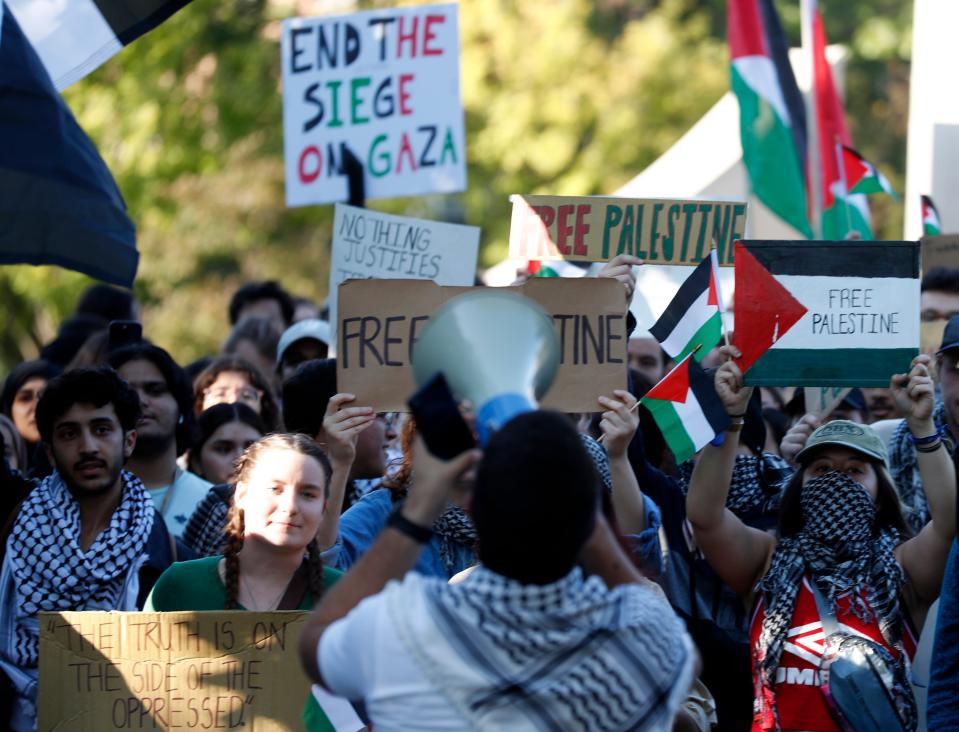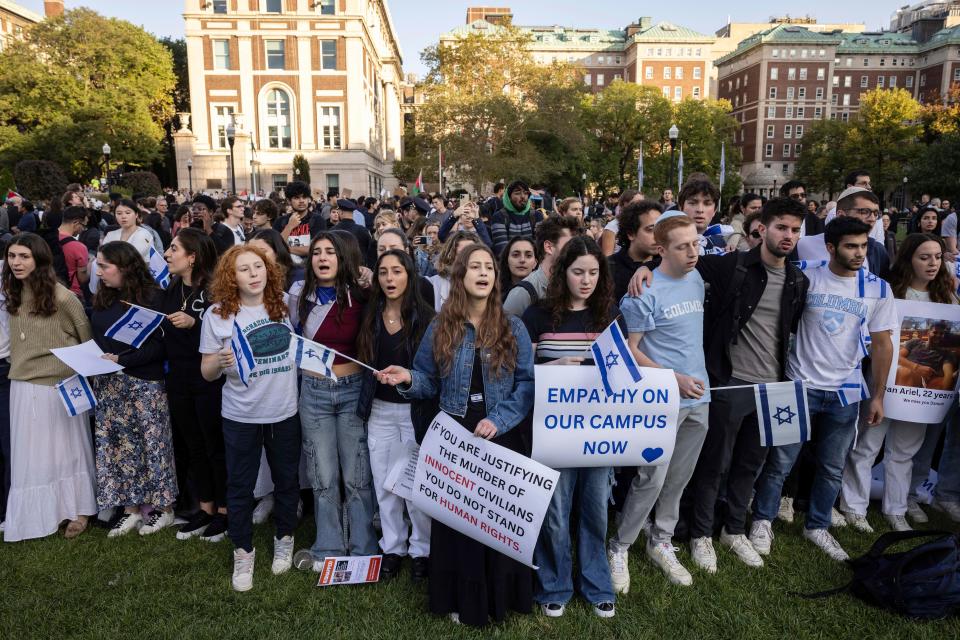Israel-Hamas protests roiled campuses. Now, the feds are investigating colleges and schools
Since Oct. 7, protests over the Israel-Hamas war have upended the American education system. The tumult has been especially bad on college campuses, where antisemitic and Islamophobic incidents are spiking.
Now, the feds are stepping in.
The Education Department on Thursday confirmed that since the war began, its Office of Civil Rights has opened seven investigations related to alleged antisemitic and anti-Muslim harassment at six colleges and in one K-12 school district. They stand accused of violating federal laws prohibiting discrimination or harassment based on a person’s shared ancestry or ethnic characteristics. Schools must abide by those laws to receive federal funding.
Six of the schools are colleges or universities, mostly urban schools in the northeast. Three of them are Ivy League colleges, a class of selective schools that has drawn special ire amid disruptive protests. The seventh is a K-12 school district in Maize, Kansas. Most of the schools confirmed to USA TODAY on Friday that the Education Department recently notified them of the investigations.
The Education Department’s involvement in − and alacrity to tout − its probes into the many schools where protests and student activities have devolved into varying states of chaos in recent weeks speaks to the mounting pressure facing domestic government officials to address the now-ubiquitous feelings of anguish and fear among many Jewish and Muslim Americans.
The past month’s malaise has largely shifted into a pointed anger directed at America’s schools − the very places tasked with the increasingly challenging job of educating young people about complex topics, while also keeping them safe from being targeted for who they are.

An Education Department spokesperson declined to comment further on the cases, citing pending investigations.
During an appearance on ABC's "The View" Friday morning, Education Secretary Miguel Cardona said the department has received more complaints related to antisemitic and anti-Muslim harassment in the last month than in all of last year. He committed to transparency about future investigations.
"We anticipate many more," he said.
What happens now?
Discrimination on campus isn't new. Before the attacks on Israel by Hamas last month, the federal agency had opened other investigations into colleges and schools concerning antisemitism or Islamophobic incidents.
In a now-resolved case over alleged antisemitism at the University of Vermont, the institution was required to update its equal opportunity and antiharassment policies and procedures and issue a statement about how it doesn't tolerate acts of discrimination, including harassment, "on the bases of shared ancestry and ethnic characteristics, including antisemitism." It also had to conduct a survey about how students and staff feel about the environment on campus.
It's unclear how long the seven new investigations could last or what, if any, consequences the colleges and schools face.
Here’s what more we know:
Case 1: Cooper Union
A probe into Cooper Union, a private college in New York City, was opened on Nov. 15, according to the Education Department.
The school made headlines in late October after a video went viral that showed Jewish students huddled in a library while about two dozen pro-Palestinian student protestors slammed on the door.
Jewish students from Cooper Union had to lock themselves in the library in order to escape an aggressive Anti-Israel mob.
In America, we all should have the freedom to be who we are and worship as we please, without fear of intimidation and harassment and violence.
Where… pic.twitter.com/kTEwvOmIxj— Ritchie Torres (@RitchieTorres) October 25, 2023
Local politicians, including the Manhattan borough president and New York Rep. Ritchie Torres, were quick to condemn what they interpreted as harassment of Jewish students. But at a news conference the next day, New York Police Department officials said the Jewish students were not barricaded inside the library, and there was no danger to them throughout the protest.
The college did not immediately respond to a request for comment.
Case 2: University of Pennsylvania
The department opened another investigation Nov. 15 into the University of Pennsylvania, which has been the target of efforts to dox some students, as well as a revolt from its wealthy alumni.
Former U.S. ambassador and Utah governor Jon Huntsman Jr., who has donated millions to the university, told the school’s president in an October email obtained by the campus newspaper, the Daily Pennsylvanian, that the school had become “deeply adrift in ways that make it almost unrecognizable” after, in his view, not responding adequately to the war in its early days.
“Moral relativism has fueled the university’s race to the bottom and sadly now has reached a point where remaining impartial is no longer an option,” he wrote.
A junior was recently arrested and charged with theft after allegedly stealing an Israeli flag, the newspaper reported.
The complaint was filed by the Brandeis Center, a Jewish civil rights organization that has filed other complaints about antisemitism on college campuses, including some of the ones involved in the seven new investigations.
Spokesperson Steve Silverman said in an email to USA TODAY that the university received the letter notifying administrators of the federal investigation and looks forward to fully cooperating with the department.
“President [Liz] Magill has made clear antisemitism is vile and pernicious and has no place at Penn,” he said, adding, “the University will continue to vigilantly combat antisemitism and all forms of hate.”
Case 3: Columbia University
Faculty and students at Columbia University, a private Ivy League college in Manhattan in New York City that is another target of an open investigation, have expressed outrage over the last week after university administrators decided to cut off funding to two anti-Zionist student groups.

The clubs − Students for Justice in Palestine and Jewish Voice for Peace − violated university policies with recent protests, according to Gerald Rosberg, the school’s senior executive vice president.
The university’s new president announced a task force on antisemitism and a resource group for doxxed students earlier this month. A university spokesperson declined to comment further on the investigation.
Banned: Columbia University suspends pro-Palestinian and Jewish student clubs
Case 4: Cornell University
Antisemitic threats at Cornell University, a private college in upstate New York, ultimately led to a police intervention late last month. Posts on a Greek life forum called for the killing and raping of Jewish students.
According to prosecutors, Patrick Dai, a 21-year-old Cornell student, admitted in a seven-hour interview with the FBI that he took to social media to threaten to behead Jewish students and level an attack on a kosher dining hall.
A university spokesperson did not comment further on the Education Department’s investigation, which opened Nov. 16.
Case 5: Lafayette College
Also revealed Thursday was a probe into Lafayette College, a private liberal arts school in Easton, Pennsylvania. In an email to USA TODAY, spokesperson Scott Morse said administrators are puzzled about why the Education Department’s Office of Civil Rights is looking into the college.
“We do not know why the OCR decided to include the College in this investigation,” Morse said. “To the contrary, as recently as last week, students of differing views shared a peaceful gathering on campus to honor all those who have died in the recent violence in the Middle East."
He said the college rejects hate speech of any kind, including antisemitism and Islamophobia, and will cooperate fully with the federal government.
Case 6: Maize Unified School District
The only K-12 school district in the federal government’s sights is Maize Unified School District in a Kansas town of a few thousand people.
Spokesperson Lori Buselt said the district was notified of the probe Thursday night, will fully cooperate and takes allegations of discrimination seriously.
“The school district is dedicated to providing a place for teaching and learning that prioritizes and champions respect and inclusivity and where all students and employees feel safe and valued,” Buselt said.
Choosing a college is hard. The Israel-Hamas war is making it harder
Case 7: Wellesley College
Stacey Schmeidel, a spokesperson for Wellesley College, said in an email to USA TODAY that the complaint against the private liberal arts school in Massachusetts was also filed by the Brandeis Center.
In the Brandeis Center’s letter to the Education Department, lawyers with the Jewish advocacy group said an email was sent to dorm residents by student residential advisers in October saying, “‘there should be no space, no consideration, and no support for Zionism within the Wellesley College community.’”
On Oct. 20, Wellesley president Paula Johnson said in a statement that administrators met with those students about the incident. They later issued an apology.
“That these young leaders were able to learn from this episode gives me hope,” she said.
Zachary Schermele is a breaking news and education reporter for USA TODAY. You can reach him by email at zschermele@usatoday.com. Follow him on X at @ZachSchermele.
This article originally appeared on USA TODAY: Antisemitism, Islamophobia: Feds probe Cornell, other schools

